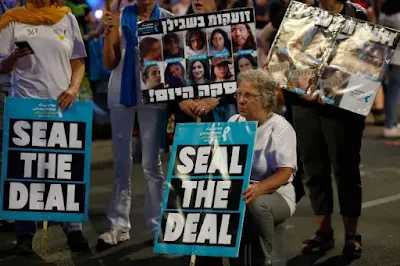After killing more than 42,000 Palestinians in little more than 12 months of fighting in Gaza, many of the reasons Israel stated for starting the conflict remain unfulfilled, analysts told
Its internal security seems even more precarious than when it started fighting on October 7, the day of a Hamas-led attack on southern Israel during which 1,139 people died and about 250 were taken captive.
Israel claimed on Thursday that it had killed Hamas leader Yahya Sinwar, who is accused of planning the October 7 attack, a man it had long said was the root of all evil. But instead of talking about a ceasefire and negotiating for the captives’ return, Israel seemed to become even more belligerent.
Translation: The chief of staff: “We will not stop until we catch all the terrorists who were involved in 7/10 and return all the abductees home.
Israel launched military assaults on one, then a second front after the October 7, 2023, attacks.
It began with Gaza, starting a war on the besieged enclave that, after more than 12 months of fighting, has achieved little but the deaths of tens of thousands of civilians.
Increasingly, it finds itself returning to areas it previously declared cleared, claiming that the Hamas fighters it had declared removed had regrouped.
On October 8, 2023, the Lebanese group Hezbollah started a cross-border exchange of fire with Israel, aiming at Israeli military targets to pressure it to stop the slaughter of Palestinians in Gaza.
Israel responded to the Hezbollah attacks with aerial assaults on civilian areas, often claiming after the assault that it had “targeted hidden Hezbollah assets” – an excuse it has often used in Gaza after it killed hundreds of people in strikes it declared as having targeted one “Hamas commander”.
As it fought, Israel seemed strangely in thrall of war as a concept.
For many Israelis, Tel Aviv-based analyst Ori Goldberg said, through the last 12 months, war had become part of Israel’s existence.
“People believe that war is necessary,” he said. “We believe it with a passion, even if we no longer know why or to what purpose. We just know that, whatever the problem, war is the solution.”
Meanwhile, 12 months of bloody attacks on Gaza and, more recently, Lebanon have caused major deeper societal changes in Israel, exacerbating long-held divisions and creating chasms in a society that Israeli academics have suggested may be on the point of collapse.
The past year has convulsed Israeli politics with Prime Minister Benjamin Netanyahu’s formation of a coalition cabinet in the wake of October 7, 2023, exacerbating a rise of the right-wing elements of Israeli politics. These factions were already emboldened through the prominent role they had played in a campaign to push through a judicial overhaul to limit legal oversight of government policy and parliamentary lawmaking.
In the new body, relative political newcomers, such as far-right National Security Minister Itamar Ben-Gvir and ultra-Zionist Finance Minister Bezalel Smotrich, acted in tandem, giving themselves an effective veto over Israeli policy and, as a result, an outsized voice in the national conversation.
Under the guise of necessity to get the captives in Gaza back, the aims of both ministers and their growing constituency – which lean more towards expansionism into Palestinian lands – have progressed significantly.
In the past year, Israel’s internal security apparatus, which has responsibility for policing across the country, has morphed almost into a direct extension of its minister, Ben-Gvir.
On appointing hardline Deputy Commissioner Daniel Levy as police chief in August, Ben-Gvir praised him as someone “with a Zionist and Jewish agenda” who “will lead the police according to the policy I have set for him”.
These policies are understood to include Ben-Gvir’s plan to establish a volunteer “national guard” to be deployed in the face of Palestinian unrest resulting from Israeli land grabs, armed raids and general subjugation of the Palestinians in their own country.
In the occupied West Bank, Ben-Gvir’s ideological brother and fellow settler Smotrich now has unparalleled power over construction with the right to seize Palestinian land for Israeli settlements in contravention of international law and equal power to veto Palestinian building.
In response to both the Hamas attacks and the human and financial costs of waging war on Gaza, divisions between what many Israelis regard as their secular “rationalist” majority and what the Israeli daily Haaretz described as its “wild-eyed right” have grown, with one analyst telling media that Israel is closer to civil conflict than ever.
Israelis march through the alleyways of Jerusalem's Old City to the Western Wall, waving Israeli flags on 'Jerusalem Day' to commemorate the establishment of Israeli control over the city.

